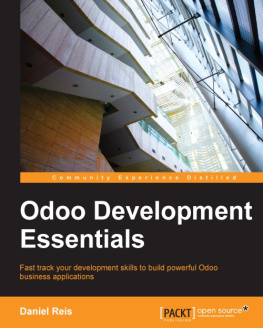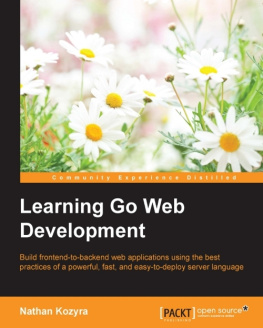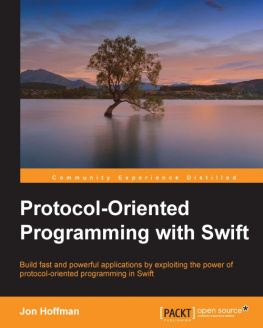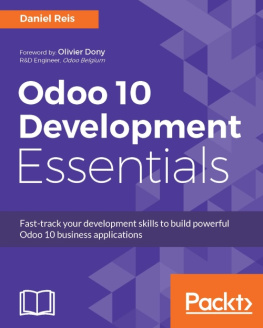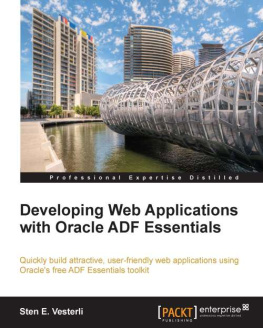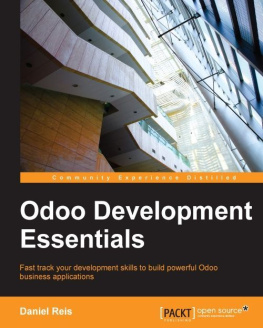He currently works at Securitas, a global security services company, where he introduced Python and Odoo into the applications portfolio.
About the Reviewers
Pedro M. Baeza is an Odoo freelance consultant, developer, and trainer with more than 16 years of experience in IT. He's been in the Odoo world for 4 years, and has been involved in its community since the beginning, first in the Spanish community, and then in the worldwide community that later formed the Odoo Community Association (OCA). Currently, he is the Spanish localization PSC and website PSC team leader, and also an active reviewer and contributor for most of the community projects.
He doesn't have direct employees, but collaborates with other companies and freelancers to deploy Odoo implementations. He feels that the best part of this is having to contact a lot of awesome people to work with to get to a common goal and that this is the perfect environment for getting close to perfection!
I would like to thank the awesome community, which is spread around the world, for pushing me a little further and adding to my knowledge. I also want to thank my girlfriend (and future wife), Esther, for understanding why I'm unable to spend time with her because of the job and my current commitment to the community.
Nicolas Bessi has been an Odoo/OpenERP developer and consultant since 2006 when it was still TinyERP. He is the author of many modules including the "report webkit" add-on that was part of the official add-ons for many years, which inspired the actual QWeb report engine.
He's an active member of Odoo Community Association and is responsible for Swiss localization. He was recognized as an OpenERP top contributor in 2010, and is still an active partisan of Open Source values.
Nicolas is a technical leader at Camptocamp, a leading society in Open Source technologies that is a historical Odoo contibutor and partner. Camtocamp is actively working alongside Odoo to bring the solution to the next level.
Alexandre Fayolle installed his first Linux distribution in 1995 (Slackware at the time, before moving to Debian in 1996) and has never used another OS on his computers since. He started using Python in 1999 when he cofounded Logilab, where he was a CTO, software architect, and Agile coach. He got the opportunity to participate in a large number of FLOSS projects, including pyxml, Pypy, Cubicweb, and Pylint. In 2012, he joined Camptocamp to work on Odoo, which was still called OpenERP at the time. He became a very active member of the Odoo Community Association, both as a direct module contributor and as a mentor to new comers. He also happens to be a jazz vibraphone player.
www.PacktPub.com
Support files, eBooks, discount offers, and more
For support files and downloads related to your book, please visit www.PacktPub.com.
Did you know that Packt offers eBook versions of every book published, with PDF and ePub files available? You can upgrade to the eBook version at > for more details.
At www.PacktPub.com, you can also read a collection of free technical articles, sign up for a range of free newsletters and receive exclusive discounts and offers on Packt books and eBooks.
https://www2.packtpub.com/books/subscription/packtlib
Do you need instant solutions to your IT questions? PacktLib is Packt's online digital book library. Here, you can search, access, and read Packt's entire library of books.
Why subscribe?
- Fully searchable across every book published by Packt
- Copy and paste, print, and bookmark content
- On demand and accessible via a web browser
Free access for Packt account holders
If you have an account with Packt at www.PacktPub.com, you can use this to access PacktLib today and view 9 entirely free books. Simply use your login credentials for immediate access.
Preface
Odoo is a powerful open source platform for business applications. On top of it a suite of closely integrated applications was built, covering all business areas from CRM and Sales to Accounting and Stocks. Odoo has a dynamic and growing community around it, constantly adding features, connectors, and additional business apps.
Odoo Development Essentials provides a step-by-step guide to Odoo development to quickly climb the learning curve and become productive in the Odoo application platform.
The first three chapters aim to make the reader comfortable with Odoo, the basic techniques to set up a development environment, and with the module development approach and workflow.
The next five chapters explain in detail several development areas used in modules: data files, models, views, business logic, and QWeb.
The two final chapters guide you through integrating Odoo applications with external applications and discuss what to consider when deploying your Odoo instance for production use.

